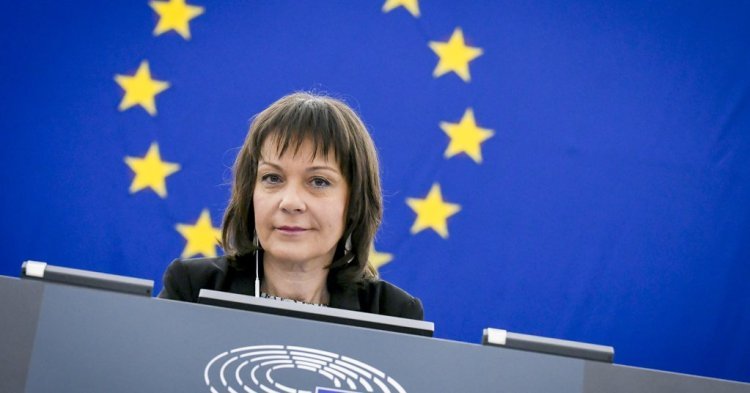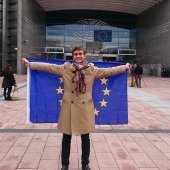Le Taurillon (LT): Good afternoon, Sylvie Guillaume. The editorial team of Le Taurillon would like to thank you for this interview. It is often said that “young people are the future”. Does this mean that they are only the actors of tomorrow, and what is their role today?
Sylvie Guillaume (SG): When we talk about young people, we need to be careful not to generalise. Young Europeans have different personal, social and academic situations, and what’s more, in 28 different countries. Therefore, you are not addressing a homogeneous crowd. There is no single “profile” of a young person, but a lot of young people in very different situations and I want to speak to all of them. Speaking to these young people is also helping those who are the furthest from the decision-making forums and from education to get closer to these things.
Yes, young people are actors of tomorrow, actors to whom we must give all the possibilities to reach their goals. Once the opportunities are present, they are the ones who have to seize them, to build their paths, and to develop their own talents.
LT: The European Parliament organised a new edition of the European Youth Event (EYE) from 1 to 2 June, an event designed to give the floor to young people. However, many of them don’t necessarily know this kind of initiatives, or don’t have the means to take part in them. How to give a voice to young people and to encourage them to vote?
SG: The EYE was a real success. The energy and joyfulness were very exciting. Participating in an event where 9,000 young people meet each other is quite a special moment in the life of an elected representative.
You could indeed think that those young people who participated are the ones with the best opportunities: the education and the financial resources. And indeed, we met these young people among the 9,000. For my part, I made the opposite choice by deciding to dedicate energy and money to finding the young people who aren’t usually concerned with EYE.
I went to meet young people in rural education centres [1] in my constituency, young people who don’t know of this event and who could think that they can’t participate. Participating in EYE with these young people was a beautiful moment: they found their place, they were very brave, very engaged and determined. One of the participants told me afterwards that he felt considered and listened to. I found that particularly moving, and that drives me all the more to do this again.
To encourage young people to vote, I’d prefer to concentrate on the source of their disaffection towards these elections, especially as studies show that if we miss the first time that a young person is able to vote in European elections, later on they will never feel concerned with these elections. It is therefore fundamental that they participate right from the first time onwards. We need to speak to them, have a different and more concrete speech, meet them, advocate for solutions to their difficulties, and give them the floor in spaces of democratic expression to show them that voting matters, that they are the ones who decide.
LT: But this trust has to be reciprocal. The difficulties that young people face, in particular in finding jobs and succeeding in their studies, weaken the confidence they can have towards the institutions and political decision-makers. Could there be voluntarist policies at a European level to respond to these problems?
SG: The EU has rather few direct competencies on youth policy, one has to rely on the national level. But we have the not inconsiderable role of a platform for highlighting and exchanging best practices. And I think that we have used them rather well in the last few years. We are in the process of preparing the next youth strategy which obviously addresses unemployment and jobs, as these are unfortunately still the difficulties that young people are facing.
This strategy calls for an even stronger mobilisation of the Youth Employment Initiative and the Youth Guarantee, as well as for a real European space for public debate dedicated to young people. I also think of the European Voluntary Service which also is a concrete example of the development and mobilisation of young people’s capabilities in public life.
It is essential that this youth strategy gets financial support. Regarding the Interrail plan, I personally remain sceptical towards the approach. This project that was supported by Manfred Weber, President of the European People’s Party (EPP) group, consists in granting a free train ticket to travel in Europe for 15,000 young people by random selection. This is not what I would have prioritised in our youth policy: I fear perverse effects and the exclusion of certain groups.
LT: The lack of communication and information given by European institutions is frequently deplored. This is a massive issue with the European elections approaching. How will the European Parliament’s campaign to inform people about these elections encourage them to vote and foster informed voting?
SG: The Parliament won’t conduct a political campaign, but indeed there will be an institutional strategy. Concerning the content, the major issues are the message that we want to deliver, the groups we want to speak to, including youth, and how to distribute this message in the different member states. We mainly rely on our internal resources at the Directorate-General for Communication to mobilise our intimate knowledge of European politics. I understood that the institutional campaign strategy, in both form and substance, is largely tailored for young people.
LT: On the other hand, what should we expect from non-institutional actors like the media?
SG: What we’re expecting of the media is for them to do their work more thoroughly than last time. We expect a stronger engagement in a pedagogical approach. Of course, we can’t expect the media to do a campaign on their own, but rather to feed a high-quality debate. At present I’m hopeful, having witnessed in the recent years a growing media presence for broadcasts dedicated to Europe.
There is a more familiar “background noise” on European questions. Thus, we create a strategy towards the public and the media that will be launched sufficiently early for this background noise to be more and more audible in the course of the months. And to anticipate your question, we will have to live with fake news. The more visible one is, the more one is a victim of this phenomenon. We have strengthened our teams battling against fake news and working on fact checking, communicating with the media and the wider public.
LT: Transnational lists won’t be in effect for the upcoming European elections. How to make these elections a real coming together of Europeans, despite this failing?
SG: Objectively, the addition of transnational lists to the elections would bring visibility to this truly European dimension. Despite everything, we have taken steps like organising the elections around the Spitzenkandidaten process, an initiative that we care a lot about in the European Parliament. It is a supplementary asset for politicising the campaigns and bringing visibility to the issues.
But objectively, it is true that national issues very much mark and give the rhythm to European elections, which sometimes, if not always, are used to settle accounts at the national level, through Europe. Transnational lists would be a considerable advance for the visibility of European questions, and an important step towards accepting that the right level of discussion and analysis is the European one.
LT: In 1979, at the very first elections to the European Parliament, 16% of the elected MEPs were women. Since then, more and more women have been elected to represent citizens in the European hemicycle – 38% in 2014. How can the European Parliament inspire the women of today and tomorrow to engage?
SG: The advance could be better but it’s true that it’s a positive performance compared to other parliaments: we exceed the 38% proportion of female MEPs. Firstly, there is a very important function of exemplariness. The number is one thing, positions of power are another. The European Parliament has also progressed in terms of women’s roles in the hundred-or-so positions of responsibility. Then, there is a function of visibility. It is essential that female elected representatives express themselves and are visible in the European public space to showcase their work and presence.
While in some member states, female elected representatives are sometimes still confined to positions related to the social dimension, in the European Parliament these barriers have completely collapsed. The technicality, complexity, visibility or the prestigious side of this or that committee is rather shared between men and women. You can find female politicians engaged in topics like transport, just like you can find male politicians who have chosen to work in the FEMM committee (Committee on Women’s Rights and Gender Equality).
This crossing of practices and interests gives more visibility to women entering European public life. I am strongly convinced that women will be more and more present in this European Parliament. I also have confidence in the examples from within the European Parliament and in our capacity to succeed as MEPs. The fact that we have a certain distance from the hierarchy or from a “leader” might leave us a greater autonomy, liberty of action and freedom to interpret.
LT: To conclude this interview, what do you think are the big issues that the current European Parliament has to respond to in the following months, and what message would you like to address to European citizens reading this?
SG: Even if it is often said that the EU went through crises and that this is the way the EU has progressed in the last seventy years, there is still a concentration and a reiteration of the different crises that the EU has been going through for many years. Since 2008, we have been through very difficult things, from a banking and financial standpoint, but then also economic and social. We have been through dismantling: for the first time, a country is preparing to leave the EU, we’re still in an unresolved humanitarian crisis related to migration, and in parallel we observe the rise of the extremes and of populism.
We must at the same time treat the symptoms and the causes. We need to stop being hysterical about the different crises and find concrete solutions. The EU has to be more visible, deliver more answers. If I had to cite two particular policies on which we need to act rapidly, I’d pick the questions of immigration and asylum policy, and the economic governance of the Union. We are conscious of these problems, and we know the solutions. Now, we have to act on the Eurozone, appoint a common finance minister, reform the European Central Bank, and put in place a parliament and a budget for the Eurozone. We now need very concrete things.



Follow the comments: |
|
